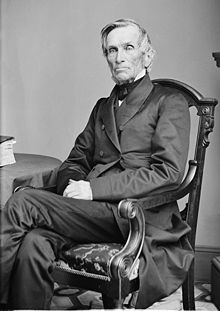Theodore Frelinghuysen | |
|---|---|
 | |
| 7th President of Rutgers University | |
| In office 1850–1862 | |
| Preceded by | Abraham Bruyn Hasbrouck |
| Succeeded by | William Campbell |
| 2nd Chancellor of New York University | |
| In office 1839–1850 | |
| Preceded by | James M. Mathews |
| Succeeded by | Isaac Ferris |
| 2nd Mayor of Newark | |
| In office November 10, 1837 – November 10, 1838 | |
| Preceded by | William Halsey |
| Succeeded by | James Miller |
| United States Senator from New Jersey | |
| In office March 4, 1829 – March 3, 1835 | |
| Preceded by | Mahlon Dickerson |
| Succeeded by | Garret D. Wall |
| 12th Attorney General of New Jersey | |
| In office February 6, 1817 – March 4, 1829 | |
| Governor | Isaac Halstead Williamson |
| Preceded by | Aaron Woodruff |
| Succeeded by | Samuel L. Southard |
| Personal details | |
| Born | March 28, 1787 Franklin Township, New Jersey, U.S. |
| Died | April 12, 1862 (aged 75) New Brunswick, New Jersey, U.S. |
| Political party | Federalist (Before 1829) National Republican (1829–1834) Whig (1834–1854) |
| Spouses | Charlotte Mercer
(m. 1809, died)Harriet Pumpelly
(m. 1857–1862) |
| Relatives | Frelinghuysen family Frederick Frelinghuysen (Father) |
| Education | Princeton University (BA) |
| Signature | |
Theodore Frelinghuysen (March 28, 1787 – April 12, 1862) was an American politician who represented New Jersey in the United States Senate. He was the Whig vice presidential nominee in the election of 1844, running on a ticket with Henry Clay.
Born in Somerset County, New Jersey, Frelinghuysen established a legal practice in Newark, New Jersey, after graduating from the College of New Jersey. He was the son of Senator Frederick Frelinghuysen and the adoptive father of Secretary of State Frederick Theodore Frelinghuysen. He served as the New Jersey Attorney General from 1817 to 1829 and as a United States Senator from 1829 to 1835. In the Senate, Frelinghuysen strongly opposed President Andrew Jackson's policy of Indian removal. After leaving the Senate, he served as the Mayor of Newark from 1837 to 1838.
Frelinghuysen was selected as Clay's running mate at the 1844 Whig National Convention. In the 1844 election, the Whig ticket was narrowly defeated by the Democratic ticket of James K. Polk and George M. Dallas. Frelinghuysen served as president of New York University from 1839 to 1850, and as president of Rutgers College from 1850 to 1862. Upon its incorporation in 1848, Frelinghuysen Township, New Jersey, was named after him.[1]
- ^ Brief History of Frelinghuysen Township[permanent dead link], Frelinghuysen Township, New Jersey. Accessed August 15, 2007.